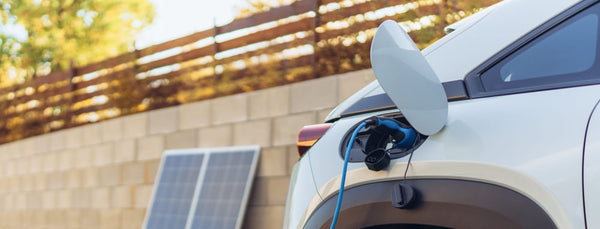
How Solar Panels Can Charge Your Electric Car in the UK: Costs, Efficiency and Savings
Thinking about charging your electric vehicle (EV) with solar panels? In the UK, rising energy tariffs and growing interest in renewable energy have many EV owners asking:
-
Can solar panels fully charge my electric car?
-
How many solar panels would I need?
-
Is it actually cost-effective compared to grid energy charging?
In this guide, we’ll break down how solar EV charging works, the costs involved, the savings you can expect, and whether it’s the right choice for your home.
How Does a Solar Panel EV Charger Work?
Solar panels make electricity by changing sunlight into energy you can use. When connected to an EV charger, this renewable power can directly charge your car’s battery.
-
The photovoltaic cells in solar panels capture sunlight, converting it into direct current (DC) energy.
-
A solar inverter then transforms this DC electricity into alternating current (AC), making it safe and suitable for your household appliances and electric vehicle charging.
-
This energy flows through your consumer unit, powering your home and electric vehicle safely.
Adding battery storage lets you save extra energy that you do not use right away. You can use this energy later. You can make money by selling extra energy back to power companies when they need it more.
A solar-compatible EV charger makes sure power flows well. If you have a home battery, you can store extra energy made during the day for charging at night.
Can Solar Panels Fully Charge an EV in the UK?
The short answer is yes, but it depends on several factors.
-
Number of panels installed: A typical EV battery (4-60 kWh) may require 10-15 solar panels for a full charge.
-
Sunlight levels in the UK: The south of England receives more annual sun hours than Scotland, so it will likely charge a car quickly.
-
Car usage: Daily mileage impacts whether you need additional grid charging.
For example, if you drive 20 miles a day, around 4-5 solar panels could cover your energy needs on average.
Switch to sustainable driving using solar panels to charge your EV and experience the benefits of harnessing solar energy to charge electric cars.
Benefits of a Solar Panel EV Charger
There are many benefits to installing a solar panel EV charger, both for your home and the environment, as well as the benefits of EV vehicles overall.
-
Embracing solar-powered EV charging amplifies the environmental advantages of driving an electric vehicle. While EVs reduce emissions, charging them with clean energy from solar energy maximises these benefits and reduces reliance on fossil fuels.
-
Installing a solar PV system requires minimal maintenance and can cut around one tonne of carbon emissions per year when used as a solar panel EV charger. This not only benefits the planet, but it also proves to be a smart, long-term investment.
-
Using Solar panels to charge electric cars is often more economical than relying solely on grid electricity. For example, an average 4kW solar array in the UK could save you over £400 per year on energy costs.
-
A standard domestic solar PV system can generate enough electricity to fully charge an electric vehicle while improving your household’s energy efficiency. Any excess electricity can often be sold back to utility companies, further reducing your energy bills.
Switching to solar power is an important step for owning a green vehicle. It is also a smart financial choice. Understanding the cost to charge your electric car can help you make an informed decision about switching to solar charging.
Understand the “COST TO CHARGE YOUR ELECTRIC CAR” to help you make your decision to convert to solar charging.

Solar panels to charge electric cars should be a considered purchase
Final Considerations for Solar Panels for Cars & Charging
While installing a solar panel EV charger can offer significant long-term savings, the decision involves upfront costs and consideration of local weather conditions.
Initial costs
Switching to an electric vehicle and a solar EV home charger may seem expensive initially, especially compared to petrol or diesel vehicles. Public charging can also add to costs. Installing a solar EV charger at home can lower your electric bills a lot over time. This makes it a smart investment for the future.
Weather impacts
Weather affects the energy that your solar panel can harvest. While panels work in all weather conditions, they perform best in sunny locations. Place your solar panels where they get the most sunlight. This helps them work best to charge electric cars.
Space availability
The number of panels required depends on your energy needs, EV battery size, or the number of vehicles you want to charge. Before purchasing, consider roof space or sunlit areas around your home to ensure your solar EV charger operates efficiently.
|
Get in touch with Volta EV, EV charger suppliers, for your solar EV charging requirements and queries: Call: 01883789148 Email: sales@voltaev.co.uk |

